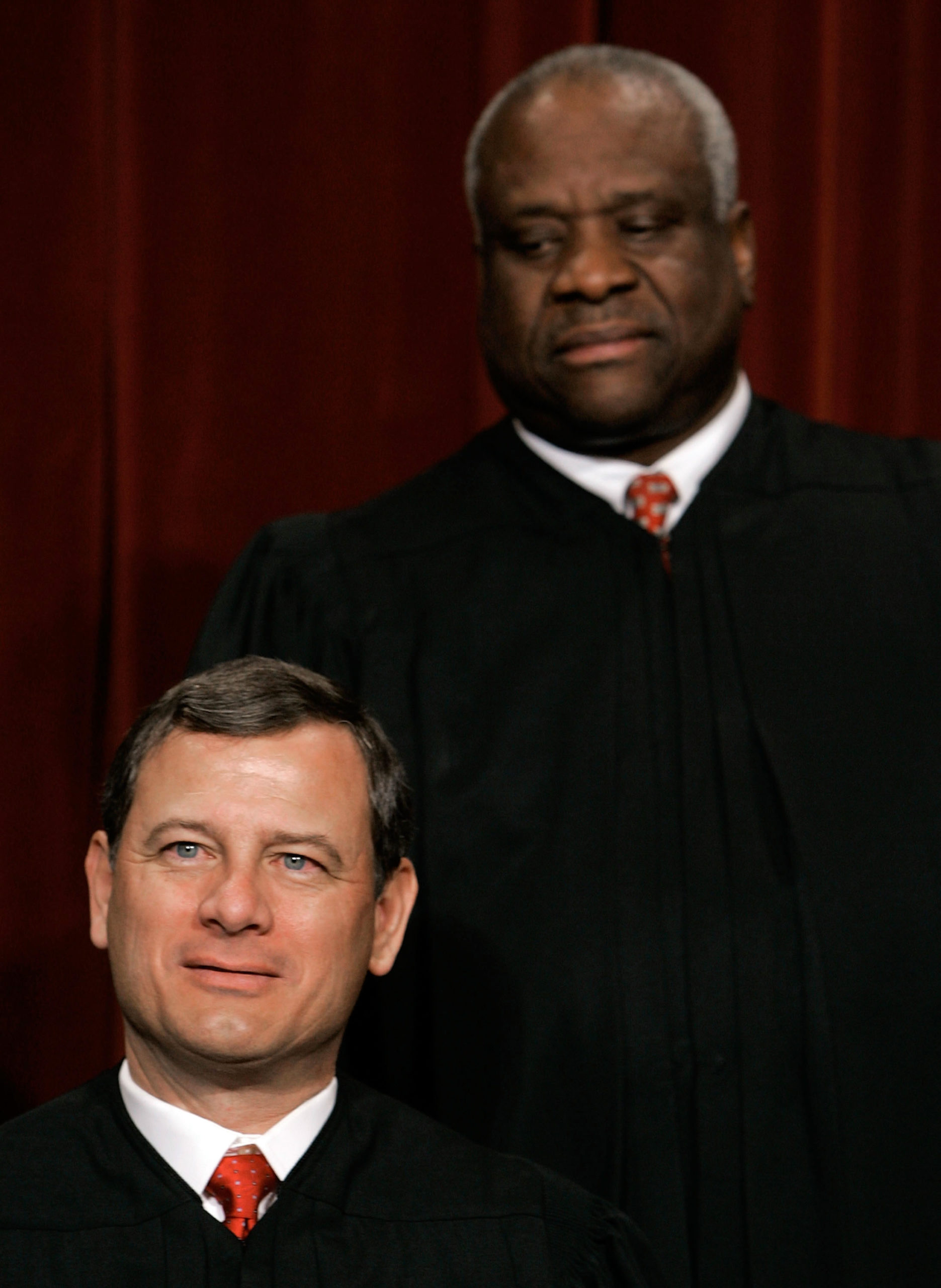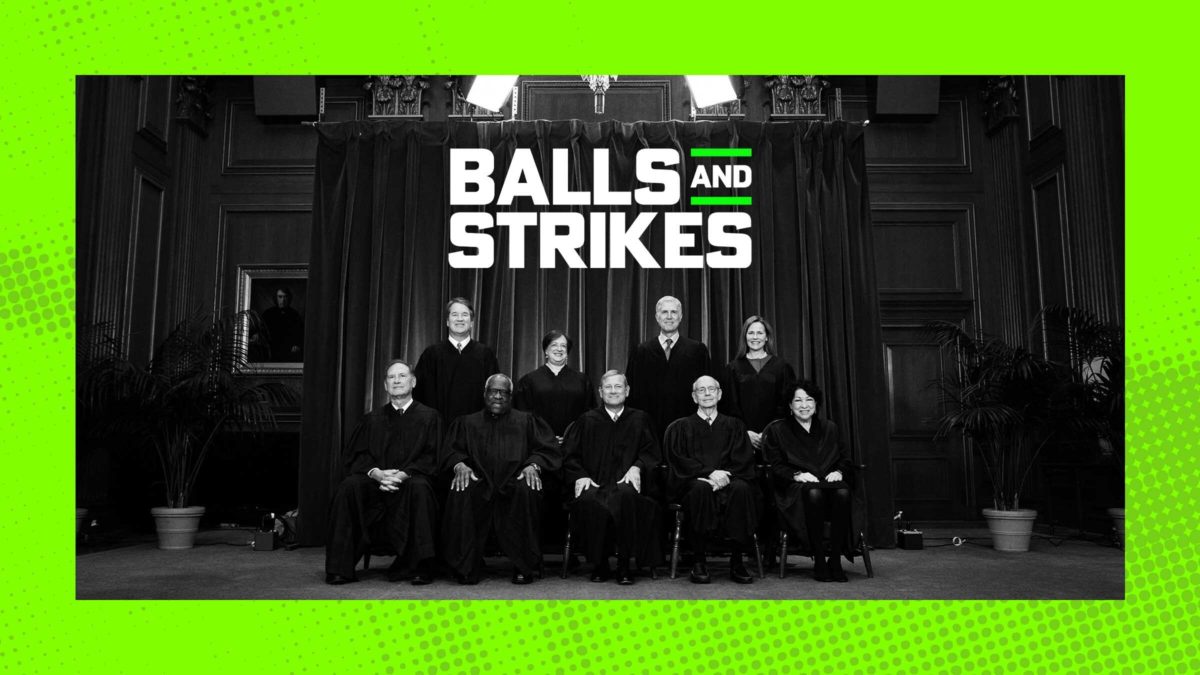Earlier this week, a month after the Supreme Court overturned Roe v. Wade and ended the right to abortion access in America, CNN published a bombshell report from legal analyst Joan Biskupic that conveys a very important message: This is not John Roberts’s fault.
The chief justice has long been one of Washington’s hardest-working PR flacks; in his book The Most Dangerous Branch, the author David Kaplan writes that Roberts has cultivated such good relationships with the D.C. press corps that observers joke that he goes to lunch three times a day. Biskupic’s coverage of the fallout from Dobbs v. Jackson Women’s Health Organization, headlined “The Inside Story of How John Roberts Failed to Save Abortion Rights,” casts him as a principled institutionalist, thwarted in his bid for compromise by an unfortunate breach of the Court’s trust.
Although Roberts “privately lobbied fellow conservatives to save the constitutional right to abortion down to the bitter end,” Biskupic reports, the leaked draft in Dobbs “made the effort all but impossible.” Invoking his history of brokering “cross-ideological compromises” in high-profile cases, Biskupic explains that under normal circumstances, Roberts can “work in private, seeking and offering concessions,” trying to cobble together an unlikely coalition. This time, though, the draft’s publication “shattered the usual secrecy of negotiations and likely locked in votes, if they were not already solid.”
Biskupic, who authored a 2019 biography of Roberts, characterizes the result as a disappointment: “a startling departure from a half century of precedent” that “flouted the court’s traditional adherence to judicial restraint.” Again, the message is clear: But for factors beyond his control, Roberts, against all odds, might have saved the day once more.
This framework suffers from the same problem that infuses all Roberts hagiography: It obfuscates his motivations. John Roberts is part of a conservative legal movement that has spent five decades straining to end abortion rights. As an advisor in the Reagan administration, he derided the “so-called ‘right to privacy,’” and argued that an anti-choice group’s proposal to hold a memorial service for aborted fetuses was “an entirely appropriate means of calling attention to the abortion tragedy.” Many people are mourning the death of Roe right now. John Roberts is not among them.
Instead, to the extent Roberts is agitated enough about Dobbs to talk about it on background to friendly reporters, it is because he feels his conservative colleagues acted too brashly to get rid of Roe, thus putting the Court’s reputation in jeopardy. For most of his tenure, Roberts’s fixation with institutional legitimacy was savvy politics: He understood that a Court perceived as operating above the partisan fray would be insulated from much of the criticism its reactionary opinions—often, his reactionary opinions—would otherwise elicit. Roberts wants the same real-world outcomes Sam Alito wants; he just prefers to take a little longer to translate the conservative policy agenda into more polite legalese.
The five conservatives to Roberts’s right do not share his view, and are not even pretending to care about maintaining appearances. Per Biskupic, Roberts’s overtures to Justices Brett Kavanaugh and Amy Coney Barrett were met with a polite but unreceptive audience, and the five-justice anti-choice coalition held firm. (Roberts concurred in the judgment, criticizing the majority’s choice to end Roe while voting to uphold Mississippi’s 15-week abortion ban—which, for the record, flagrantly violates the precedent he was ostensibly fighting for.) As Emmett Witkovsky-Eldred wrote in Balls & Strikes last year, Roberts “has been eclipsed by the same conservative legal movement he’s championed for his entire life.”
Intra-Federalist Society disagreements about process, however, are not the same as substantive disagreements about whose rights the law protects, and whose rights it ignores. A story that chronicles Roberts’s fight to “save the constitutional right to abortion down to the bitter end” suggests that Roberts actually cared about preserving that right in the first place. He did not. Framing his political machinations as a noble bid to uphold the Court’s “traditional adherence to judicial restraint” papers over his role in empowering the Supreme Court as an engine of reactionary politics. He’ll be happily reaping the rewards for years to come.
As always, you can find us at ballsandstrikes.org, or follow us on Twitter @ballsstrikes, or get in touch via [email protected]. Thanks for reading.
This Week In Balls & Strikes
The Conservative Agenda Depends On Judges Being Terrible Historians, Jacob Hammond
By giving lower court judges a task they can’t complete, the Court’s conservatives are setting themselves up as the only amateur historians who matter.
How the Supreme Court’s Liberals Abandoned Immigrants, Yvette Borja
The conservative justices are constantly pushing the law to the right. Too often, the liberal justices simply lie down and surrender.
Why Aren’t Progressive Lawmakers Backing Supreme Court Expansion?, Yvette Borja
The Congressional Progressive Caucus has endorsed the Judiciary Act of 2021, which would add four seats to the Supreme Court. But nearly half the caucus’s members still haven’t signed on.
This Week In Other Stuff We Appreciated
The Supreme Court Is Making America Ungovernable, Lisa Heinzerling, The Atlantic
The West Virginia v. EPA ruling signals a future in which no one in power has the ability to tackle the biggest issues society faces.
Once Again, The Supreme Court Upends a Legal Norm, Peter Shane, Washington Monthly
The Court’s efforts to take over immigration law enforcement from the executive branch continue apace.
Is Democracy Constitutional?, Adam Serwer, The Atlantic
In Moore v. Harper, the Supreme Court will decide if anyone besides itself should be able to adjudicate American election law.
The Hosts of ‘5-4’ Never Trusted the Supreme Court, Reggie Ugwu, The New York Times
“Brett Kavanaugh writes like if you gave a talented law student a concussion.”
This Week In Obscure Photos of Supreme Court Justices On Getty Images


